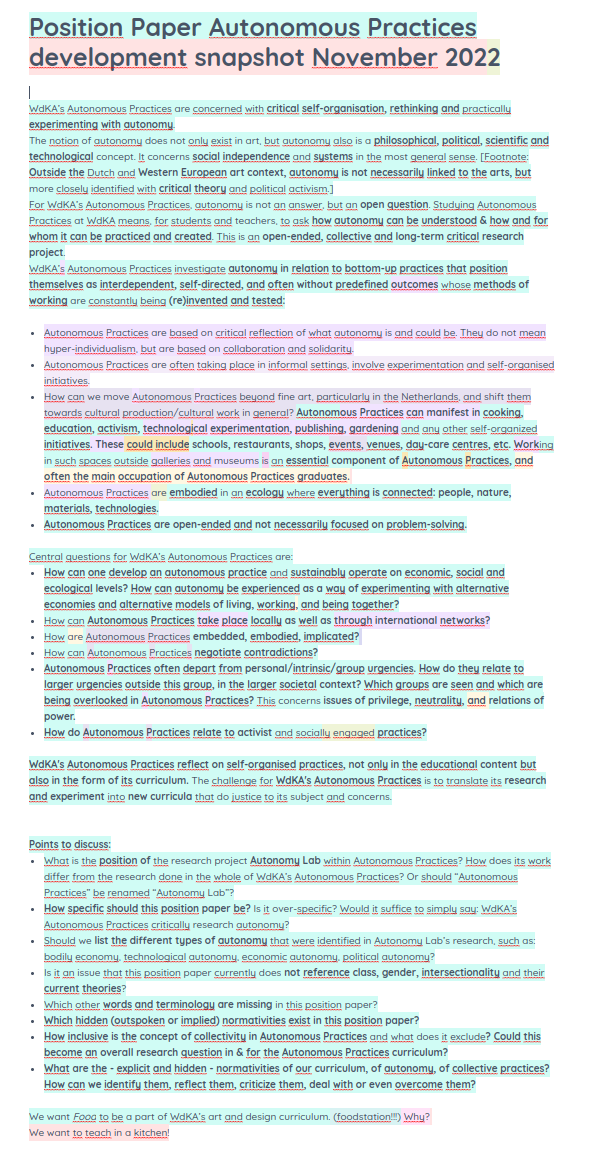| Date | 11/24/2022 |
| Time | 00:00 |
| Location | Willem de Kooning Academy |
| Researchers | |
| Affiliated research project |
|
position paper Autonomous Practices
development snapshot November 2022
(collectively written by WdKA Autonomous Practices tutors, with critical feedback from students)
WdKA’s Autonomous Practices are concerned with critical self-organisation, rethinking and practically experimenting with autonomy.
The notion of autonomy does not only exist in art, but autonomy also is a philosophical, political, scientific and technological concept. It concerns social independence and systems in the most general sense. [Footnote: Outside the Dutch and Western European art context, autonomy is not necessarily linked to the arts, but more closely identified with critical theory and political activism.]
For WdKA’s Autonomous Practices, autonomy is not an answer, but an open question. Studying Autonomous Practices at WdKA means, for students and teachers, to ask how autonomy can be understood & how and for whom it can be practiced and created. This is an open-ended, collective and long-term critical research project.
WdKA’s Autonomous Practices investigate autonomy in relation to bottom-up practices that position themselves as interdependent, self-directed, and often without predefined outcomes whose methods of working are constantly being (re)invented and tested:
- Autonomous Practices are based on critical reflection of what autonomy is and could be. They do not mean hyper-individualism, but are based on collaboration and solidarity.
- Autonomous Practices are often taking place in informal settings, involve experimentation and self-organised initiatives.
- How can we move Autonomous Practices beyond fine art, particularly in the Netherlands, and shift them towards cultural production/cultural work in general? Autonomous Practices can manifest in cooking, education, activism, technological experimentation, publishing, gardening and any other self-organized initiatives. These could include schools, restaurants, shops, events, venues, day-care centres, etc. Working in such spaces outside galleries and museums is an essential component of Autonomous Practices, and often the main occupation of Autonomous Practices graduates.
- Autonomous Practices are embodied in an ecology where everything is connected: people, nature, materials, technologies.
- Autonomous Practices are open-ended and not necessarily focused on problem-solving.
Central questions for WdKA’s Autonomous Practices are:
- How can one develop an autonomous practice and sustainably operate on economic, social and ecological levels? How can autonomy be experienced as a way of experimenting with alternative economies and alternative models of living, working, and being together?
- How can Autonomous Practices take place locally as well as through international networks?
- How are Autonomous Practices embedded, embodied, implicated?
- How can Autonomous Practices negotiate contradictions?
- Autonomous Practices often depart from personal/intrinsic/group urgencies. How do they relate to larger urgencies outside this group, in the larger societal context? Which groups are seen and which are being overlooked in Autonomous Practices? This concerns issues of privilege, neutrality, and relations of power.
- How do Autonomous Practices relate to activist and socially engaged practices?
WdKA’s Autonomous Practices reflect on self-organised practices, not only in the educational content but also in the form of its curriculum. The challenge for WdKA’s Autonomous Practices is to translate its research and experiment into new curricula that do justice to its subject and concerns.
Points to discuss:
- What is the position of the research project Autonomy Lab within Autonomous Practices? How does its work differ from the research done in the whole of WdKA’s Autonomous Practices? Or should “Autonomous Practices” be renamed “Autonomy Lab”?
- How specific should this position paper be? Is it over-specific? Would it suffice to simply say: WdKA’s Autonomous Practices critically research autonomy?
- Should we list the different types of autonomy that were identified in Autonomy Lab’s research, such as: bodily economy, technological autonomy, economic autonomy, political autonomy?
- Is it an issue that this position paper currently does not reference class, gender, intersectionality and their current theories?
- Which other words and terminology are missing in this position paper?
- Which hidden (outspoken or implied) normativities exist in this position paper?
- How inclusive is the concept of collectivity in Autonomous Practices and what does it exclude? Could this become an overall research question in & for the Autonomous Practices curriculum?
- What are the – explicit and hidden – normativities of our curriculum, of autonomy, of collective practices? How can we identify them, reflect them, criticize them, deal with or even overcome them?
We want Food to be a part of WdKA’s art and design curriculum. (foodstation!!!) Why?
We want to teach in a kitchen!
